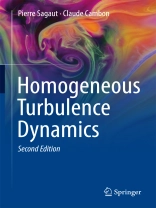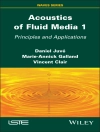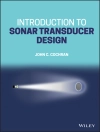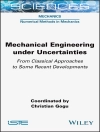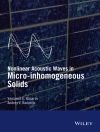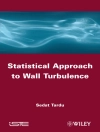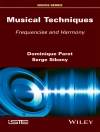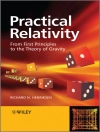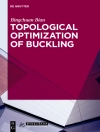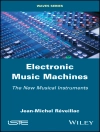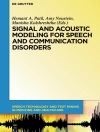This book provides state-of-the-art results and theories in homogeneous turbulence, including anisotropy and compressibility effects with extension to quantum turbulence, magneto-hydodynamic turbulence and turbulence in non-newtonian fluids. Each chapter is devoted to a given type of interaction (strain, rotation, shear, etc.), and presents and compares experimental data, numerical results, analysis of the Reynolds stress budget equations and advanced multipoint spectral theories. The role of both linear and non-linear mechanisms is emphasized. The link between the statistical properties and the dynamics of coherent structures is also addressed. Despite its restriction to homogeneous turbulence, the book is of interest to all people working in turbulence, since the basic physical mechanisms which are present in all turbulent flows are explained. The reader will find a unified presentation of the results and a clear presentation of existing controversies. Special attention is givento bridge the results obtained in different research communities. Mathematical tools and advanced physical models are detailed in dedicated chapters.
İçerik tablosu
Introduction.- Scope of the book.- Structure and contents of the second edition of the book.- Governing equations, from dynamics to statistics.- Background deterministic equations.- Briefs about statistical and probabilistic approaches.- Reynolds Stress tensor and related equations.- Anisotropy in physical space. Single-point correlations.- Spectral analysis, from random fields to two-point correlations. Local frame, helical modes.- Anisotropy for multipoint correlations.- A synthetic scheme of the closure problem: non-linearity and non-locality.- On the use of Lagrangian formalism.- Additional reminders: compressible turbulence description.- Navier-Stokes equations for compressible flows and shock jump conditions.- Introduction to modal decomposition of turbulent fluctuations.- Mean flow equations, Reynolds Stress Tensor and energy balance in compressible flows.- Incompressible homogeneous isotropic turbulence.- Observations and measures in forced and freely decaying turbulence.- Classical statistical analysis: energy cascade, local isotropy, usual characteristic scales.- Models for single-time and two-time energy spectra and velocity correlation functions.- Free decay theories: self-similarity, self-preservation, symmetries and invariants.- Recent results about decay regimes.- Reynolds Stress tensor and analysis of related equations.- Differential models for energy transfer.- Advanced analysis of energy transfers in Fourier space.- Pressure field: spectrum, scales and time evolution.- Topological analysis, coherent events and related dynamics.- Non-linear dynamics in the physical space.- What are the proper features of three-dimensional Navier-Stokes turbulence?.- Isotropic turbulence with coupled microstructures: Visco-elastic turbulence.- Introduction to turbulence in dilute polymer solutions.- Governing equations.- Description of turbulence with FENE-P model.- Turbulence régimes in dilute polymer solution.- Visco-elastic effects on flow topology.- Isotropic turbulence with coupled microstructures. Quantum Turbulence.- Introductory phenomenology to Quantum Turbulence.- The three levels of description and physical modelling.- Quantized vortices and Kelvin Waves: facts and models.- Quantum Turbulence dynamics at zero or nearly-zero temperature.- The decay of isotropic Quantum Turbulence.- Mutual friction: microscopic origin and models.- Incompressible homogeneous anisotropic turbulence: pure rotation.- Physical and numerical experiments.- Governing equation.- Advanced analysis of energy transfer via DNS.- Balance of RST equations. A case without “production”. New tensorial modeling.- Inertial waves. Linear régime.- Nonlinear theory and modeling: Wave Turbulence and EDQNM.- Fundamental issues: solved and open questions.- Coherent structures, description and dynamics.- Scale-by-scale anisotropy.- Incompressible homogeneous anisotropic turbulence: With strain.- Main observations.- Experiments for turbulence in the presence of mean strain. Kinematics of the mean flow.- First approach in physical space to irrotational mean flows.- The fundamentals of homogeneous RDT.- Final RDT results for mean irrotational strain.- Towards a fully nonlinear approach.- Return to isotropy.- Nonhomogeneous flow cases. Coherent structures in strained homogeneous turbulence .- Incompressible homogeneous anisotropic turbulence: pure shear.- Physical and numerical experiments: kinetic energy, RST, lengthscales, anisotropy.- Reynolds Stress tensor and analysis of related equations.- Rapid Distortion Theory: equations, solutions, algebraic growth.- Nonlinear spectral analysis, simplified closure and selfsimilarity.- Return to isotropy in shear-released homogeneous turbulence.-Models for space- and space-time correlations.- Pressure field: theory and models.- Vortical structures dynamics in homogeneous shear turbulence.- Self-sustaining turbulent cycle in quasi-homogeneous sheared turbulence.- Self-sustaining processes in non-homogeneous sheared turbulence: exact coherent states and travelling wave solutions.- Incompressible homogeneous anisotropic turbulence: buoyancy force and mean stratification.- Observations, propagating and non-propagating motion. Collapse of vertical motion and layering.- Simplified equations, using Navier-Stokes and Boussinesq approximations, with uniform density gradient.- Eigenmode decomposition. Physical interpretation.- The toroidal cascade as a strong nonlinear mechanism explaining the layering.- The viewpoint of modelling and theory: RDT, Wave-Turbulence, EDQNM.- Coherent structures : dynamics and scaling of the layered flow, “pancake” dynamics, instabilities.- Unstable Stratified Homogeneous Turbulence.- Extension to the mixing zone resulting from Rayleigh-Taylor instability and beyond.- Coupled effects : rotation, stratification, strain and shear.- Governing equations for the dynamics of coupled effects.- Rotating stratified turbulence.- Rotation or stratification with mean shear.- Shear, rotation and stratification. Approach to baroclinic instability.- The elliptical flow instability from /homogeneous’ RDT.- Axisymmetric strain with rotation.- Relevance of RDT and WKB RDT variants for analysis of transient growth and exponential instabilities.- Incompressible homogeneous anisotropic turbulence: Magnetohydrodynamic turbulence.- Generalities, analogies and differences with respect to the purely hydrodynamic case.- Governing equations.- Alfvén waves and Ohmic damping. Linear régime.- The Quasi-Static régime, from linear to nonlinear dynamics.- A first statistical approach, Kolmogorov-Monin laws, without mean magnetic field.- Refined analysis: Triadic interactions in MHD without mean magnetic field.- MHD turbulence and interactions with other body forces and mean gradients.- Homogeneous incompressible MHD turbulence and beyond.- Compressible homogeneous isotropic turbulence.- Different régimes in compressible turbulence.- Structures in the physical space.- Compressible homogeneous isotropic turbulence.- Different regimes in compressible turbulence.- Quasi-isentropic turbulent regime.- Low-Mach thermal regimes.- Nonlinear subsonic regimes.- Supersonic regime.- Structures in the physical space.- Compressible homogeneous anisotropic turbulence.- Effects of compressibility in free shear flows. Observations.- A general quasi-isentropic approach to homogeneous compressible shear flows.- Incompressible turbulence with compressible mean flow effects: compressed turbulence.- Compressible turbulence in the presence of pure plane shear.- Perspectives and open issues.- Topological analysis, coherent events and related dynamics.- Canonical isotropic turbulence/shock interaction and beyond.- Brief survey of existing interaction regimes.- Wrinkled shock régime: Linear interaction.- Wrinkled shock régime: Nonlinear interaction.- Broken shock régime.- Beyond canonical case. I: Spherical shock waves.- Beyond canonical case. II: Planar shock interacting with turbulence in a non-reacting binary mixture.- Beyond canonical case. III: Planar detonation interacting with turbulence.- Linear Interaction Approximation for shock/perturbation interaction.- Shock description and emitted fluctuating field.- Calculation of wave vectors of emitted waves.- Calculation of amplitude of emitted waves.- Distinguishing between poloidal and toroidal vorticity modes.- Reconstruction of the second order moments.- Further analytical work: exact and asymptotic LIA solutions based on Laplace transform.- A posteriori assessment of LIA in the canonical interaction case.- Extending LIA: I. Interaction with rarefaction waves.- Extending LIA: II. Case of non-reacting binary mixtures of perfect gas.- Extending LIA: III. Thin strong detonation/turbulence interaction.- The essentials of linear and nonlinear theories and models.- Rapid Distortion Theory for homogeneous turbulence.- Zonal RDT and short-wave stability analysis.- Application to statistical modeling of inhomogeneous turbulence.- Other perspectives in extended linearized approaches.- Generalities on triadic closures.- Solving the linear operator to account for strong anisotropy.- A general EDQN closure. Different levels of markovianization.- Detailed equations from EDQNM1 in the model by Mons, Cambon and Sagaut.- Application of three EDQNM(1-2-3) versions to the rotating turbulence.- Other cases of flows with and without production.- Connection with self-consistent theories: single-time or two-time?.- Applications to weak or moderate anisotropy.- Open numerical problems.- Conclusions and perspectives.- Homogenization of turbulence. Local or global homogeneity? Physical space or Fourier space?.- Linear theory, `homogeneous’ RDT, WKB variants, and LIA.- Multi-point closures for weak and strong turbulence.- Structure formation, structuring effects and individual coherent structures.- Anisotropy including dimensionality, a main theme.- Deriving practical models.- Bibliography.- Index.
